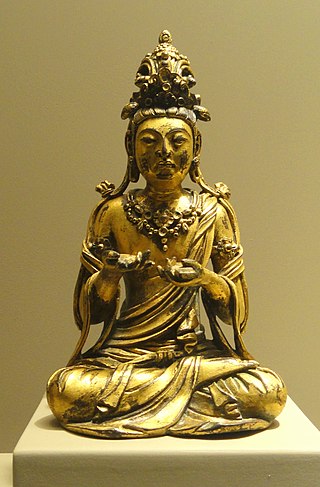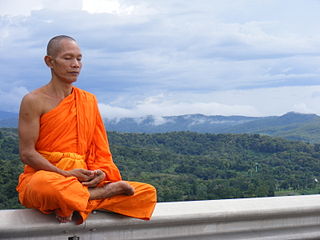In the Buddhist tradition, the five hindrances are identified as mental factors that hinder progress in meditation and in daily life. In the Theravada tradition, these factors are identified specifically as obstacles to the jhānas within meditation practice. Within the Mahayana tradition, the five hindrances are identified as obstacles to samatha (tranquility) meditation. Contemporary Insight Meditation teachers identify the five hindrances as obstacles to mindfulness meditation.

Prajñā or paññā is a Buddhist term often translated as "wisdom", "insight", "intelligence", or "understanding". It is described in Buddhist texts as the understanding of the true nature of phenomena. In the context of Buddhist meditation, it is the ability to understand the three characteristics of all things: anicca ("impermanence"), dukkha, and anattā. Mahāyāna texts describe it as the understanding of śūnyatā ("emptiness"). It is part of the Threefold Training in Buddhism, and is one of the ten pāramīs of Theravāda Buddhism and one of the six Mahāyāna pāramitās.
Śrāvaka (Sanskrit) or Sāvaka (Pali) means "hearer" or, more generally, "disciple". This term is used in Buddhism and Jainism. In Jainism, a śrāvaka is any lay Jain so the term śrāvaka has been used for the Jain community itself. Śrāvakācāras are the lay conduct outlined within the treaties by Śvetāmbara or Digambara mendicants. "In parallel to the prescriptive texts, Jain religious teachers have written a number of stories to illustrate vows in practice and produced a rich répertoire of characters.".

In Buddhism, the Seven Factors of Awakening are:
Maitrī means benevolence, loving-kindness, friendliness, amity, good will, and active interest in others. It is the first of the four sublime states and one of the ten pāramīs of the Theravāda school of Buddhism.
The Buddhist Publication Society (BPS) is a publishing house with charitable status, whose objective is to disseminate the teachings of Gautama Buddha. It was founded in Kandy, Sri Lanka, in 1958 by two Sri Lankan lay Buddhists, A.S. Karunaratna and Richard Abeyasekera, and a European-born Buddhist monk, Nyanaponika Thera. Originally conceived as a limited effort to publish small, affordable books on fundamental Buddhist topics, the Society expanded in scope in response to the reception of their early publishing efforts. The Buddhist Publication Society's publications reflect the perspective of the Theravada denomination of Buddhism, drawing heavily from the Pāli Canon for source material.
Sati, literally "memory" or "retention", commonly translated as mindfulness, "to remember to observe", is an essential part of Buddhist practice. It has the related meanings of calling to mind the wholesome dhammas such as the four establishments of mindfulness, the five faculties, the five powers, the seven awakening-factors, the Noble Eightfold Path, and the attainment of insight, and the actual practice of maintaining a lucid awareness of the dhammas of bodily and mental phenomena, in order to counter the arising of unwholesome states, and to develop wholesome states. It is the first factor of the Seven Factors of Enlightenment. "Correct" or "right" mindfulness is the seventh element of the Noble Eightfold Path.

The Ānāpānasati Sutta (Pāli) or Ānāpānasmṛti Sūtra (Sanskrit), "Breath-Mindfulness Discourse," Majjhima Nikaya 118, is a discourse that details the Buddha's instruction on using awareness of the breath (anapana) as an initial focus for meditation.

The Dhammacakkappavattana Sutta is a Buddhist scripture that is considered by Buddhists to be a record of the first sermon given by Gautama Buddha, the Sermon in the Deer Park at Sarnath. The main topic of this sutta is the Four Noble Truths, which refer to and express the basic orientation of Buddhism in a formulaic expression. This sutta also refers to the Buddhist concepts of the Middle Way, impermanence, and dependent origination.

Nyanaponika Thera or Nyanaponika Mahathera was a Sri Lankan Theravada Buddhist monk and scholar who, after ordaining in Sri Lanka, later became the co-founder of the Buddhist Publication Society and author of numerous seminal books and articles on Theravada Buddhism. He mentored and taught a whole generation of Western Buddhist leaders such as Bhikkhu Bodhi.
Pūrṇa Maitrāyanīputra, also simply known as Pūrṇa, was an arhat and one of the ten principal disciples of Gautama Buddha, foremost in preaching the dharma.

The Dighajanu Sutta, also known as the Byagghapajja Sutta or Vyagghapajja Sutta, is part of the Anguttara Nikaya. For Theravadin scholars, this discourse of the Pāli Canon is one of several considered key to understanding Buddhist lay ethics. In this discourse, the Buddha instructs a householder named Dīghajāṇu Vyagghapajja, a Koliyan householder, on eight personality traits or conditions that lead to happiness and well-being in this and future lives.
Sampajañña is a term of central importance for meditative practice in all Buddhist traditions. It refers to "The mental process by which one continuously monitors one's own body and mind. In the practice of śamatha, its principal function is to note the occurrence of laxity and excitation." It is very often found in the pair 'mindfulness and introspection' or 'mindfulness and clear comprehension).

The Mettā Sutta is the name used for two Buddhist discourses found in the Pali Canon. The one, more often chanted by Theravadin monks, is also referred to as Karaṇīyamettā Sutta after the opening word, Karaṇīyam, "(This is what) should be done." It is found in the Suttanipāta and Khuddakapāṭha. It is ten verses in length and it extols both the virtuous qualities and the meditative development of mettā (Pali), traditionally translated as "loving kindness" or "friendliness". Additionally, Thanissaro Bhikkhu's translation, "goodwill", underscores that the practice is used to develop wishes for unconditional goodwill towards the object of the wish.
In Buddhism, the bodhipakkhiyā dhammā are qualities conducive or related to awakening/understanding, i.e. the factors and wholesome qualities which are developed when the mind is trained.
The Four Right Exertions are an integral part of the Buddhist path to Enlightenment (understanding). Built on the insightful recognition of the arising and non-arising of various mental qualities over time and of our ability to mindfully intervene in these ephemeral qualities, the Four Right Exertions encourage the relinquishment of harmful mental qualities and the nurturing of beneficial mental qualities.

The Sammādiṭṭhi Sutta is the 9th discourse in Majjhima Nikaya of Pāli Canon that provides an elaboration on the Buddhist notion of "right view" by the Buddha's chief disciple, Ven. Sariputta. The Chinese canon contains two corresponding translations, the Maha Kotthita Sutra (大拘絺羅經) and the Kotthita Sutra (拘絺羅經).
Ñāṇamoli Bhikkhu was a British Theravada Buddhist monk and translator of Pali literature.

The Ratana Sutta is a Buddhist discourse found in the Pali Canon's Sutta Nipata and Khuddakapatha ; with a parallel in the Mahavastu. In the Pali it is seventeen verses in length, and in the Sanskrit version nineteen. The Ratana Sutta extols the characteristics of the three ratana in Buddhism: the Enlightened One (Buddha), the Teaching (Dhamma) and the noble community of disciples.
Ven. Kaṭukurunde Ñāṇananda Mahathera was a Sri Lankan Bhikkhu and Buddhist scholar. He is best known for the research monograph Concept and Reality in Early Buddhist Thought and the exploratory study The Magic of the Mind. Ven. Ñāṇananda was the abbot of Pothgulgala Aranya, a small forest monastery in Devalegama, Sri Lanka.






